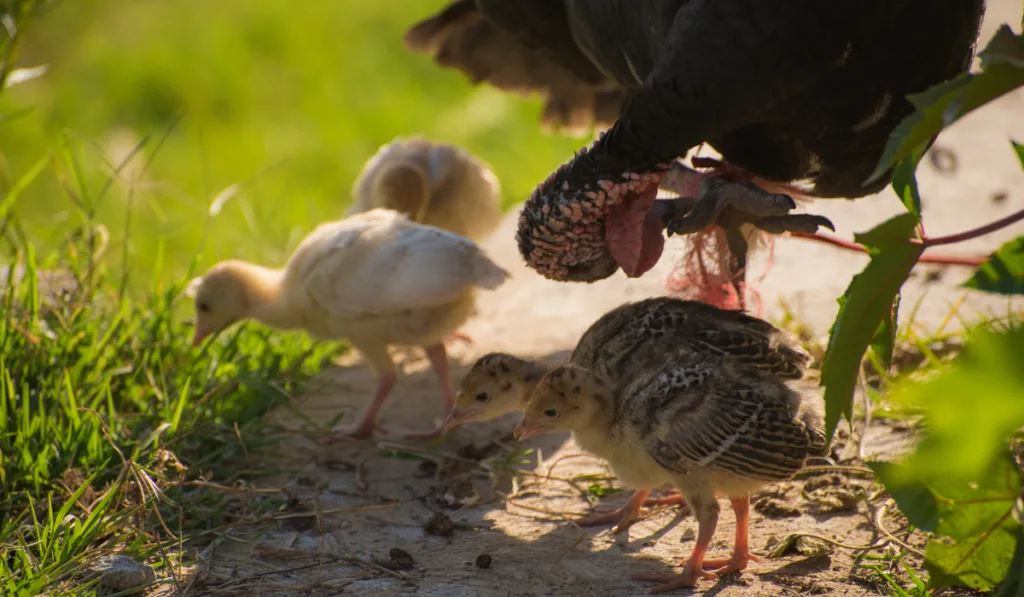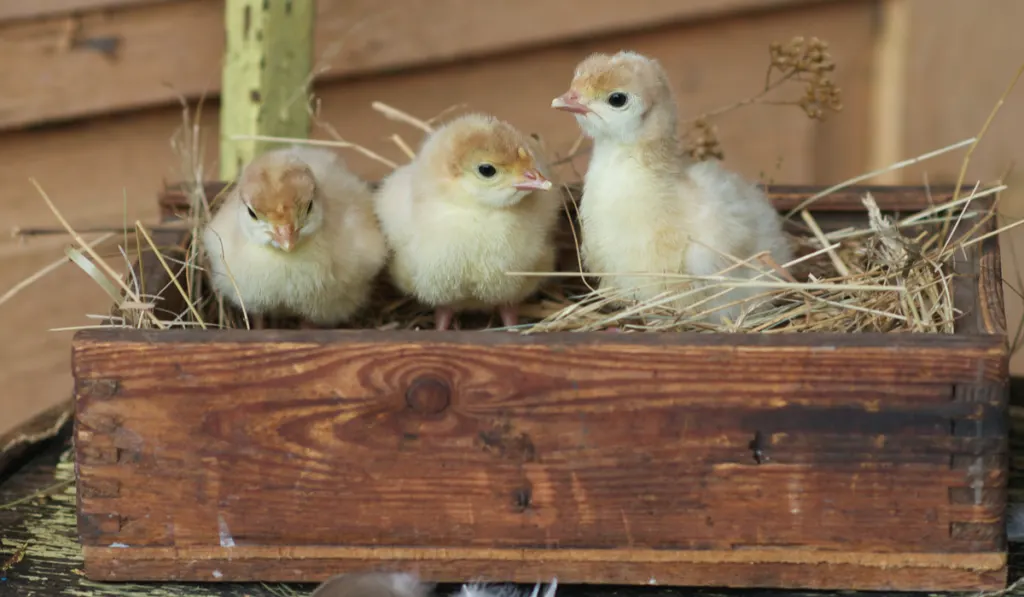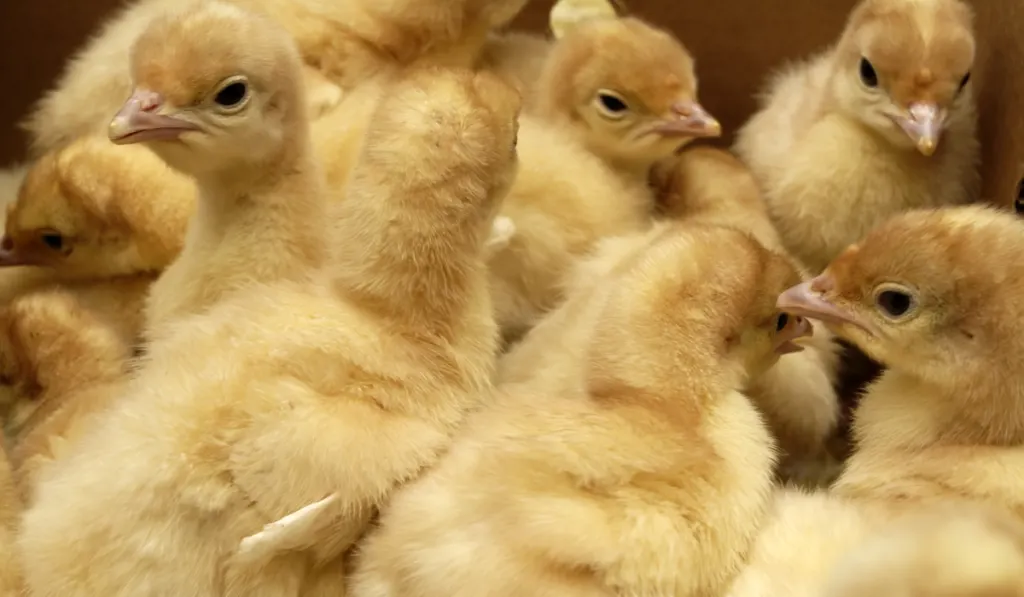Raising turkeys is similar to raising baby chicks, but you need to remember that they are very different animals.
A lot of folks who give raising baby turkeys a try run into trouble. In just 24 hours after receiving your baby turkeys, you might see some of them become noticeably weaker and die the next day.
Seeing baby turkeys die can be very hard, especially if you’re raising them with your kids at home.
Children often don’t understand that death happens with small, fragile animals all the time, and if you don’t know what you’re doing, you can see several of your baby turkeys die in just a week or so.
Even if you know what you’re doing, baby turkeys will die sometimes. You don’t know what type of condition they came to you in, and sometimes there just isn’t anything you can do about them dying.

There are, however, some things to help you shorten the learning curve when it comes to raising baby turkeys.
Here are 11 reasons your baby turkeys are dying and some things you can do about it.
Table of Contents
1. Not Getting Enough Protein
A lot of people think that turkeys are just bigger chickens.
They feed them the chicken starter and other feed designed for chickens without knowing they are essentially dooming their baby turkeys.
Turkeys, because of their larger size, need a diet with much more protein than baby chicks.
Instead, you should buy feed designed specifically for baby turkeys with the protein in it to sustain them in those critical first few weeks and months of life.
2. They Are Too Cold
Depending on where you live and where you are keeping your baby turkeys, if they get too cold they can easily die.
Baby turkeys need time to develop the down necessary to keep them warm and protect them from the wind.
Before you buy baby turkeys, you need to purchase a heat lamp to keep them warm in a confined area until they grow more feathers.
3. They Are Too Hot
Just like keeping your baby turkeys too cold can accidentally kill them, keeping them too hot can be fatal as well.
Some well-meaning owners pump the heat lamp way too high and end up overheating their turkeys.
You’ll want to keep your temps indoors at around 95-100 degrees Fahrenheit to make your baby turkeys feel the most comfortable and give them the best chance at survival.
4. Temperature Changes
This is the final note about temperature. In addition to paying attention to hot and cold temperatures; exposing baby turkeys to large temperature swings can kill them as well.
That can happen when inexperienced owners decide to take their baby turkeys straight from under a heat lamp to cooler temperatures outdoors.
The drastic change can be too much of a shock to their system and kill them.

5. There Is No Shade Outside
You’ve got to make sure that there is ample shade outside whenever you let your baby turkeys out.
Remember that, particularly on hot days, turkeys will flock to shady areas as a way to manage sun exposure and keep their body temperatures in control.
Without enough shade, they can get heatstroke and die. Take note as well that, depending on the design of your coop and where it is in the yard, temperatures inside the coop can be hotter than out in the sun.
Keep a close eye on how hot things get in the coop to keep things cool for your turkeys.
6. Predators Get to Them
A lot of poultry owners have to deal with foxes, coyotes, and even family dogs getting to their chickens and turkeys.
It can be hard to deal with, especially after you’ve put so much time into keeping them warm under a heat lamp and transitioning them outside successfully.
You’ve got to ensure that their coop and enclosure are as secure as possible.
This is most important at night when you are asleep because that’s when foxes and other predators move around the most.
Baby turkeys will be a very attractive target to them, so you have to put in the work to keep them as safe as possible.
7. They Die of Thirst
Believe it or not, some baby turkeys won’t be able to tell that there is a bowl of water available in their pen even if you set it down right in front of them.
All they will see is the bowl because the water is clear. They won’t even go over to test it out to find out there is water inside.
You’ve got to make sure the turkeys know where the water is or they will die of thirst. You can make things easier by putting marbles inside the water to make it so they can see the water more easily.
8. There Is Not Enough Space
When you get the temperature just right with your heat lamp, you’re going to need enough space so that the turkeys can feel comfortable.
If it is too small of a space, they may not be able to get to the sides of the box or enclosure where they can cool off when things get too hot.
Additionally, keeping too many baby turkeys in a small space can trigger their anxiety which can kill them.

9. Anxiety
Baby turkeys, just like most baby animals, need to stay calm.
Getting overly excited or too anxious can be deadly. Overhandling baby turkeys, shaking them in their box, keeping them awake for too long, and other factors can kill them because they become too anxious.
Limit the amount of time you and any children spend with baby turkeys until they’re more physically stable.
10. Things Get Too Moist
If your bedding is wet or moisture gets into your feed, it can kill your baby turkeys.
A lot of people are taken aback when they hear that wet turkey feed can mold quickly and can be lethal to young birds.
Check on the feed you’re using and their bedding to make sure they are sufficiently dry. It’s easy for these young birds to get an infection and spread it to other birds around them.
11. They Catch Infections
As you can probably imagine, baby turkeys don’t have very strong immune systems just yet.
As a result, they’re at higher risk of catching infections. One sick bird, can, in turn, spread disease to the other birds and you could end up with several dead turkeys on your hands.
Things like mold, as we’ve stated, can cause respiratory infections, and changes in temps can make them sick.
If their pen isn’t kept clean, they can stir up their droppings and end up eating them which can also make them ill. Do your best to keep things clean and dry to improve their chances of avoiding any sicknesses.
Conclusion
Raising turkeys is more of a challenge than raising baby chicks, but these magnificent birds are worth the trouble.
They’re great fun for the family or on the farm and will be a great activity for your family for years.
The big thing is to do your best and do your research.
Realize if you are new to raising turkeys, you’re probably going to have some baby birds die on you.
Learn as you go and keep tweaking things until you’ve got the formula right.
